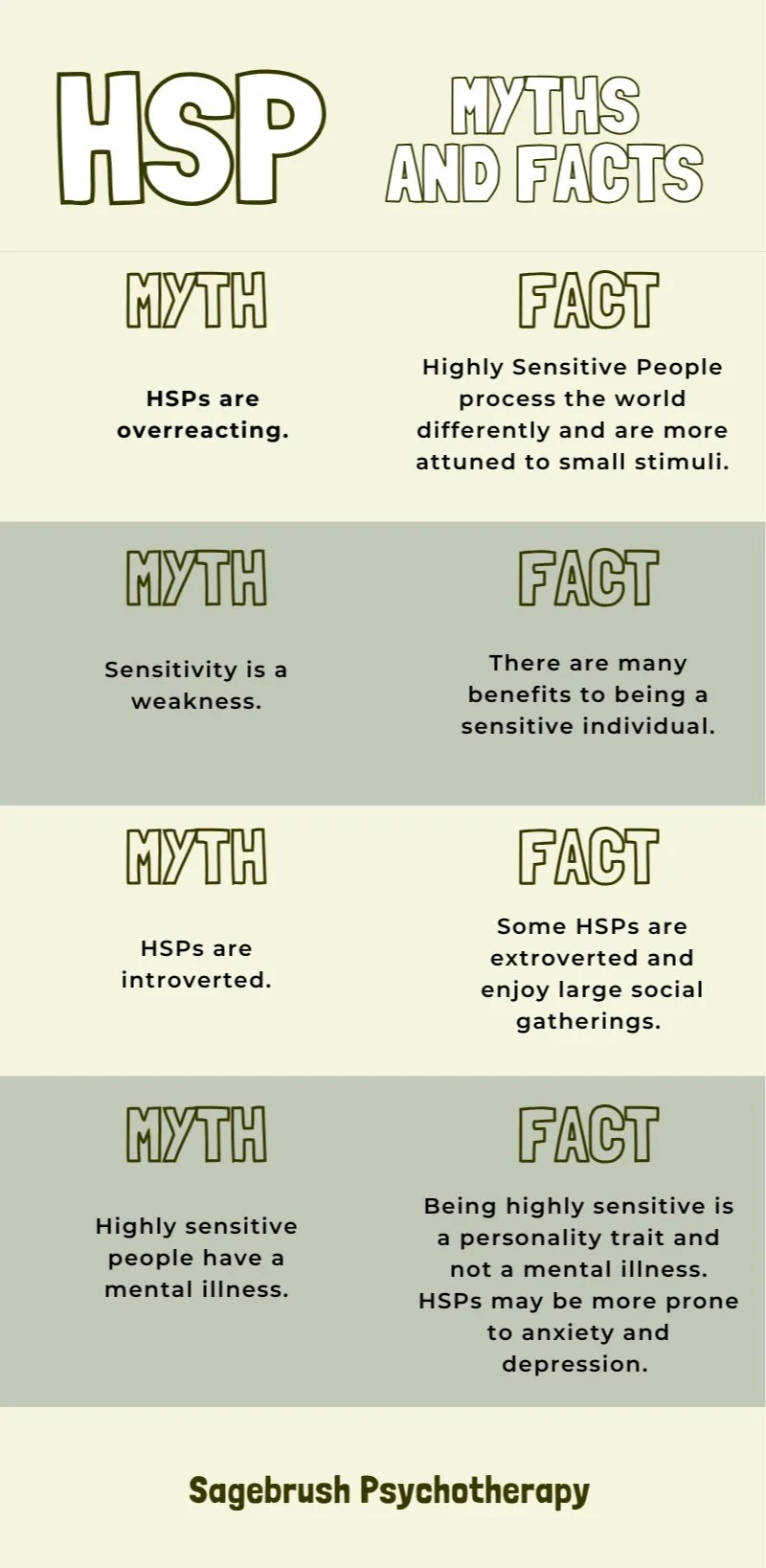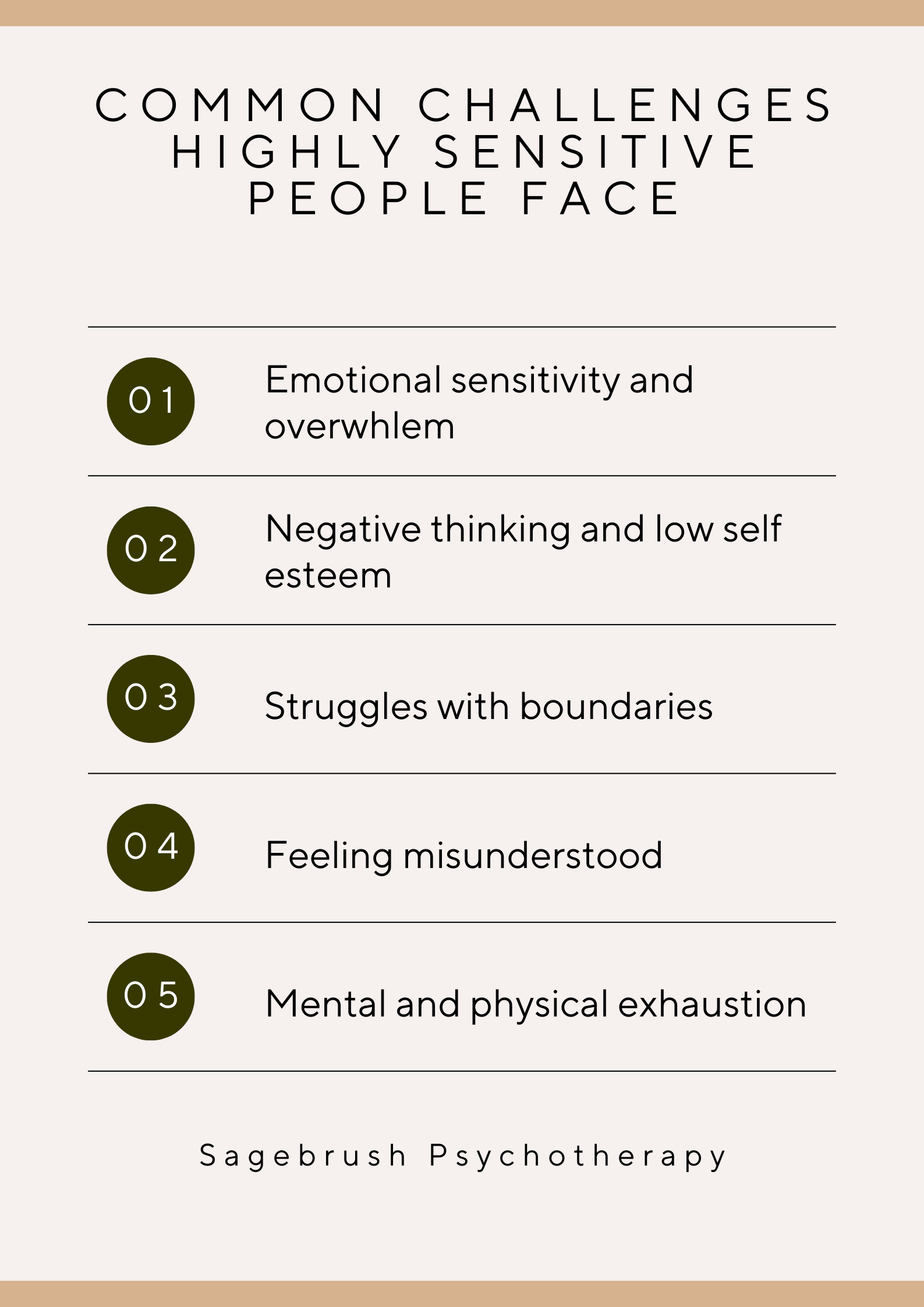Therapy for Highly Sensitive People in Los Angeles:
Support for HSPs and Empaths
Helping Highly Sensitive People Navigate the World with Confidence
Do you feel everything deeply? Do loud noises, strong smells, or subtle cues in social interactions leave you feeling overwhelmed? Do you describe yourself as an empath? Are you quick to tears or anger, experiencing intense emotions that others seem to brush off? If you tend to absorb other people’s emotions and often struggle to set boundaries, you may be a Highly Sensitive Person (HSP)—and you’re not alone.
Whether you’ve never heard of the term Highly Sensitive Person, know you are an HSP, or think you might be one, our practice is designed to support you. At Sagebrush Psychotherapy in Los Angeles, CA, we specialize in highly sensitive people therapy, offering a supportive approach to help you embrace your heightened sensitivity while managing overwhelm and emotional intensity.
Why We Specialize in Highly Sensitive People
At our practice, we understand that being a Highly Sensitive Person is not just a personality trait—it’s a way of experiencing the world. As mental health professionals, we’ve seen how sensitivity can be a gift, but we also know it can feel overwhelming in a world that doesn't always relate.
We specialize in working with HSPs because we believe in the power of sensitivity. Highly Sensitive People often bring exceptional empathy, creativity, and depth to their relationships and communities, but these same qualities can leave them feeling drained, misunderstood, or out of place.
Through personalized care and a deep commitment to understanding sensitivity, we help HSPs:
Gain tools to manage emotional intensity.
Build resilience while staying true to themselves.
Find balance in relationships and daily life.
What is a Highly Sensitive Person (HSP)? Recognizing common traits.
A Highly Sensitive Person (HSP) has a nervous system that processes sensory input and emotions more deeply than others. This increased sensitivity can feel like both a gift and a challenge. You might be deeply moved by music, art, or meaningful conversations while also feeling exhausted by small talk, fast-paced environments, or other people’s emotions.
When understanding sensory sensitivity is important to distinguish what that means. Being high sensitive should not be confused with Sensory Processing Disorder (SPD). SPD is a condition where the brain has trouble processing sensory input correctly, making sounds, lights, textures, or other stimuli feel too intense or confusing. This can interfere with daily life and may require therapy to manage. Highly Sensitive People (HSPs) do not have a disorder—they naturally notice and feel things more deeply due to a trait called sensory processing sensitivity. While both can lead to feeling overwhelmed, SPD is a processing issue in the brain, while HSPs simply have a more sensitive nervous system but can function normally with the right coping strategies.
Research suggests that high sensitivity is a natural trait present in about 15-20% of the population. It’s not a mental health disorder or a weakness—it’s simply a different way of experiencing the world. First identified by Dr. Elaine Aron, this trait is entirely normal and can be found in all cultures, genders, and walks of life.
Signs You Might Be a Highly Sensitive Person
If you're wondering whether you might be an HSP, consider these common traits:
Deep Emotional Reactions: You may cry easily, feel immense joy, or be deeply affected by art, music, or even a heartfelt commercial.
Heightened Empathy: You naturally sense and often absorb the emotions of those around you, making it easy to connect with others but sometimes overwhelming.
Sensitivity to Sensory Stimuli: Bright lights, loud noises, strong smells, or chaotic environments can feel overwhelming and even draining.
Need for Solitude: After a busy day or intense interaction, you require quiet time to recharge and process your emotions.
Thoughtful Decision-Making: You tend to weigh all options carefully, reflecting deeply before making decisions, which can sometimes lead to overthinking.
Find Highly Sensitive Person self tests here.
Myths vs. Facts About Highly Sensitive People
There are many misconceptions about Highly Sensitive People (HSPs), often leading to misunderstandings about their experiences. Being highly sensitive is not about being fragile or overemotional—it’s a personality trait linked to sensory processing sensitivity, a trait that affects how the nervous system processes stimuli.
Let’s separate fact from fiction and address some of the most common myths about HSPs.
Myth: HSPs Are Overreacting
FACT: Highly Sensitive People tend to notice subtle cues that others overlook, leading to stronger reactions to their environment. Their deep emotional processing is not an overreaction—it’s the result of their nervous system responding more intensely to sensory and emotional stimuli. Just because someone else doesn’t react the same way doesn’t mean the reaction is excessive.
Myth: Sensitivity Is a Weakness
FACT: Sensitivity is not a weakness and has many strengths. Highly sensitive people tend to have deep empathy, intuition, and creativity. While they may be more prone to feeling stressed or overwhelmed, they also excel in forming meaningful connections, making thoughtful decisions, and understanding other people’s emotions. With healthy boundaries and emotional regulation, sensitivity becomes an asset rather than a limitation.
Myth: HSPs Are Introverted
FACT: While many HSPs are introverts, about 30 percent of highly sensitive people are extroverts. Sensitivity is not about how outgoing or social someone is—it’s about how deeply they process sensory input, social interactions, and people’s emotions. Whether introverted or extroverted, HSPs benefit from alone time to recharge after intense experiences.
Myth: Highly Sensitive People Have a Mental Illness
FACT: Being an HSP is not a mental illness. It is a personality trait associated with high sensitivity, deep processing, and stronger reactions to emotional and environmental stimuli. However, because HSPs often feel overwhelmed by their surroundings, they may be more susceptible to anxiety, depression, or stress. Seeking support through therapy can help them manage their emotions and improve their overall well-being.
Common Challenges Highly Sensitive People Face
HSPs tend to feel things intensely, which can impact their mental health, relationships, and self-esteem. If you're highly sensitive, you may struggle with:
Emotional Sensitivity and Overwhelm – Feeling easily overwhelmed in social settings or by external stimuli like loud noises and strong smells.
Negative Thinking and Low Self-Esteem – Being more affected by criticism and internalizing other people’s emotions.
Struggles with Boundaries – Difficulty saying “no,” often putting others’ needs ahead of your own.
Feeling Misunderstood – Noticing subtle cues and social interactions that others overlook, leaving you feeling out of place.
Mental and Physical Exhaustion – Feeling drained after too much stimulation and needing alone time to recover.
We help sensitive people recognize their higher capacity for emotional depth while equipping them with tools to build resilience, self-acceptance, and emotional regulation.
Understanding Highly Sensitive Person Therapy
Therapy for highly sensitive people is not about changing who you are—it’s about learning how to thrive with your sensitivity instead of feeling controlled by it. Our HSP therapists in Los Angeles, CA, provide techniques to help you:
Manage Overwhelm – Learn techniques to prevent emotional overload and reduce stress from sensory input.
Strengthen Emotional Regulation – Develop skills to navigate intense emotions without feeling consumed by them.
Set Boundaries Without Guilt – Build confidence in saying "no" and prioritizing self-care.
Improve Relationships – Find balance in social interactions without absorbing other people’s emotions.
Break Free from Negative Thinking – Reframe self-criticism and cultivate self-acceptance.
Acceptance: Embracing Your Sensitivity
The first step in managing emotional overwhelm is accepting your sensitivity as a natural and valuable part of who you are. Sensitivity is not a flaw or weakness; it's a unique trait that enhances your ability to connect deeply with others and experience life's richness. Work on self validation. Remind yourself that your feelings are valid, even when they seem intense.
Building Self-Knowledge
Self-awareness is essential for understanding your triggers and recognizing when you need to pause. Knowing yourself better allows you to make intentional choices that reduce overwhelm and foster well-being.
Recognizing Triggers: Pay attention to patterns in situations that feel overwhelming, such as loud environments or emotionally charged conversations.
Knowing When to Take a Break: Develop the habit of checking in with yourself. If your heart races, you feel irritable, or your thoughts spiral, these are signs it's time to step back and recharge.
Understanding Your Limits: Recognize when something is too much, whether it's overcommitting socially or absorbing too much emotional energy from others.
Building Tolerance and Emotional Resilience
While it's important to honor your limits, building tolerance for emotional intensity can help you face challenging situations with greater ease.
Exposure in Small Steps: Gradually expose yourself to situations that feel overwhelming, like spending time in busy environments for short periods, to build your tolerance.
Grounding Techniques: Use practices like deep breathing, grounding exercises, or mindfulness to stay present and reduce stress when you're in difficult situations.
Reframing Challenges: Shift your mindset from “I can't handle this” to “This is hard, but I can take it one step at a time.”
Cultivating Self-Compassion
Self-compassion is crucial for managing emotional overwhelm without falling into self-criticism. Instead of judging yourself for your reactions, treat yourself with kindness and understanding.
Letting Go of Self-Judgment: Recognize that your emotions are not "too much" or "wrong." They're a natural response to your experiences.
Kind Self-Talk: Replace self-critical thoughts with affirming ones, such as, “It's okay to feel this way,” or “I'm doing the best I can.”
Celebrating Your Progress: Acknowledge the small steps you take toward managing overwhelm.
Starting Therapy for Highly Sensitive People in Los Angeles
We understand that being a Highly Sensitive Person (HSP) or empath comes with unique challenges, and we respect your individual experience. Whether you're looking for support in managing overstimulation, emotional intensity, or anxiety, our specialized highly sensitive person therapy is here to help.
You deserve to navigate the world with confidence, without feeling constantly drained or misunderstood. Through compassionate therapy for highly sensitive people, you can develop tools to manage overwhelm, set healthy boundaries, and embrace your sensitivity as a strength.
Visit one of our in-person offices in Los Angeles or opt for online therapy. Whether you're seeking HSP therapy, counseling for empaths, or treatment for high sensitivity, we're here to support you in creating a balanced, fulfilling life.
Frequently Asked Questions
-
Signs you might be an HSP include:
Feeling deeply moved by art, music, or nature.
Needing downtime to recharge after social interactions.
Being easily overwhelmed by loud noises or busy environments.
Picking up on others' emotions and feeling them intensely.
Noticing small details others might miss.
Take a free test online to assess further. If these resonate with you, you may benefit from therapy tailored to Highly Sensitive People.
-
HSPs process sensory and emotional information more deeply, making them more susceptible to overstimulation. Crowded spaces, intense emotions, or busy schedules can quickly lead to feelings of overwhelm. Therapy can provide techniques for recognizing triggers, managing stress, and building resilience.
-
HSPs often struggle with:
Absorbing their partner’s emotions, leading to emotional exhaustion.
Difficulty setting boundaries due to their high empathy.
Feeling misunderstood or overly sensitive to conflict.
Therapy can help you communicate your needs effectively, create healthy boundaries, and build fulfilling, supportive relationships.









